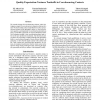Free Online Productivity Tools
i2Speak
i2Symbol
i2OCR
iTex2Img
iWeb2Print
iWeb2Shot
i2Type
iPdf2Split
iPdf2Merge
i2Bopomofo
i2Arabic
i2Style
i2Image
i2PDF
iLatex2Rtf
Sci2ools
AAAI
2012
2012
Quality Expectation-Variance Tradeoffs in Crowdsourcing Contests
We examine designs for crowdsourcing contests, where participants compete for rewards given to superior solutions of a task. We theoretically analyze tradeoffs between the expectation and variance of the principal’s utility (i.e. the best solution’s quality), and empirically test our theoretical predictions using a controlled experiment on Amazon Mechanical Turk. Our evaluation method is also crowdsourcing based and relies on the peer prediction mechanism. Our theoretical analysis shows an expectation-variance tradeoff of the principal’s utility in such contests through a Pareto efficient frontier. In particular, we show that the simple contest with 2 authors and the 2-pair contest have good theoretical properties. In contrast, our empirical results show that the 2-pair contest is the superior design among all designs tested, achieving the highest expectation and lowest variance of the principal’s utility.
AAAI 2012 | Amazon Mechanical Turk | Intelligent Agents | Prediction Mechanism | Variance Tradeoff |
| Added | 29 Sep 2012 |
| Updated | 29 Sep 2012 |
| Type | Journal |
| Year | 2012 |
| Where | AAAI |
| Authors | Xi Alice Gao, Yoram Bachrach, Peter Key, Thore Graepel |
Comments (0)

